PWA Vs Native App | At times, it can be an uphill battle to choose between native app development and progressive web app development, looking at how both specialize in their own characteristics for the good of a business. But which one will suit your business vision and bring the roar? Read on to find out the cool-headed PWA Vs Native app comparison guide.
Ever since smartphones have stepped their way into our existence, it has changed the gestures of interaction between businesses and their customers. This has left us to the stance where it would be a real challenge to even imagine an expanding business without counting the corporation from smartphones in. Users have it easy turning their heads to the businesses that have their business mobile apps as it vouches for a convenient experience with whatever they have to enjoy.
While Native apps come with a bundle of fantastic end-user experience and better mobile UX as well as advanced features, the progressive web apps enable you to shop faster, have control over costs, and reach out to your users across multiple platforms. PWAs do not require installation from an app store, whereas native apps do. So when it comes to the progressive web apps Vs native app comparison, which one is better for businesses and developers?
Should you count on a progressive web app, or should you stay up with a native app? We have composed this guide to compare native apps Vs PWA in order to help you figure out what’s best for the success of your business and not to skip- what would users love to have. You can hire PWA development services for technology consultation.
PWA Vs Native App: Which One’s Better for Businesses?
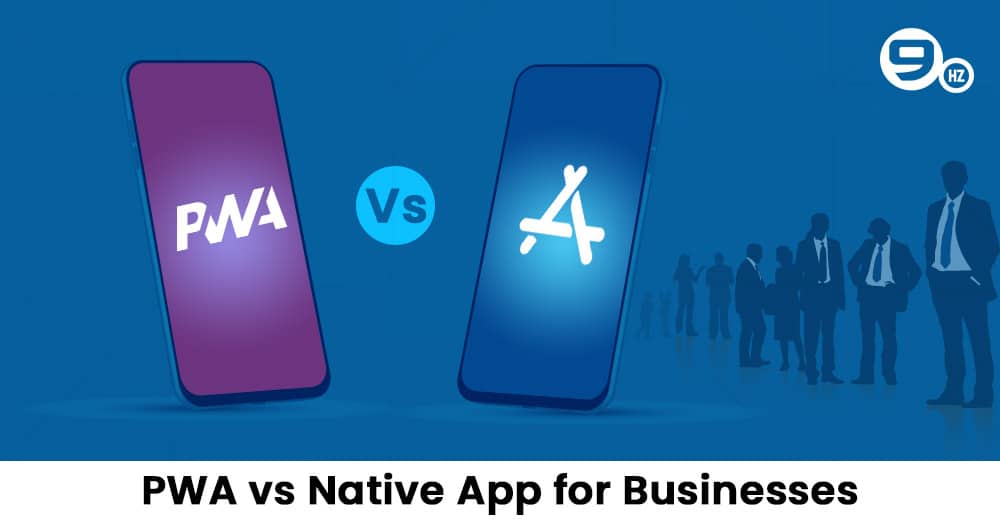
Native apps and Progressive web apps both accent their own advantages and disadvantages but which one among these two options is perfect for your business? Here are some crucial checkpoints that will help you make a choice between a PWA or native app development:
| Feature | Progressive Web App | Native App |
|---|---|---|
| Development Cost | Relatively low as it uses web technologies like HTML, CSS, and JavaScript | High as it requires separate development for each platform (iOS, Android, etc.) |
| Distribution | Can be accessed through a web browser and does not require download or installation from an app store | Must be downloaded and installed from an app store (e.g., Apple App Store, Google Play Store) |
| Device Compatibility | Compatible with any device with a modern web browser, including desktops and mobile devices | Requires separate development for each platform and may not be compatible with older devices |
| Performance | May not be as fast as a native app due to limitations of web technologies | Generally faster and more responsive due to being developed specifically for each platform |
| User Experience | Can provide a seamless user experience with features like offline functionality and push notifications | Can offer a highly immersive and engaging user experience, with access to device-specific features like the camera and microphone |
| Maintenance | Easier to maintain and update as changes can be made on the server-side | Requires separate updates for each platform and may be more complex to maintain |
1. Time to Market
In case you are a newbie and would like to ship faster, then the PWA development may be the perfect one for you. The native behavior to app development requires that you hire a dedicated team of native app developers in order to launch both Android and iOS apps. Besides that, the approval front from app stores can eat up more time than you think.
On the other hand, PWAs are faster to construct as well as ship as a progressive web app is essentially a website. It can be developed and prepped-up for a launch easily when it comes to getting the much-coveted insights from the side of the market and user. On top of that, you won’t need to stop and wait for validation from the app store, which is necessary in order to launch and distribute native apps across Apple’s App Store and Google’s Play Store.
2. Cross-Platform Availability
If you would like to expose your brand to more people and when your target audience falls in different divisions, you cannot focus on one platform and launch a native app for just iOS or Android. You will need to design and build the apps for both platforms separately in order to reach out to your customers and offer them an enhanced experience on smartphones. However, this practice is time-consuming and demands more resources.
On the other side, progressive web apps are designed to act responsively and they make it faster and easier to be able to reach out to target users, irrespective of the platform they use.
3. Development Cost
Native app development cost is demanded more from your budget in order to build when you really want native features because then you have to work on both versions separately.
On the other hand, the progressive web app development cost behaves calmly in this concern and costs less. It is because a PWA is essentially a web app that is designed to function with an approach of an application on any mobile.
Progressive Web Apps vs Native App: Which One’s Better for Developers?
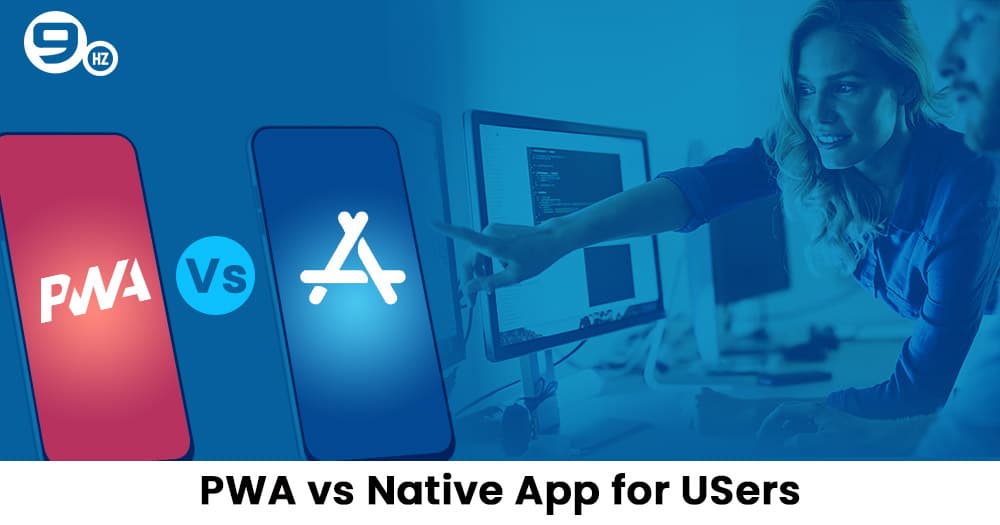
Your users count for a valuable source to oil the growth of your business and thus, you cannot go with a decision to select a progressive web application or a native application without weighing the pros and cons from a user’s vantage view. This is why we have brought the eminent checkpoints to help you compare PWAs and native apps from an end-user perspective.
| Feature | Progressive Web App | Native App |
|---|---|---|
| Development Tools | Uses web development tools such as HTML, CSS, and JavaScript, which are widely available and familiar to most developers | Requires platform-specific development tools such as Xcode for iOS and Android Studio for Android |
| Development Time | Faster development time as one codebase can be used for all platforms, and changes can be made on the server-side | Longer development time as separate development is required for each platform |
| App Store Approval | No need for app store approval as the app can be accessed through a web browser | Must go through the app store approval process which can be time-consuming and may require changes to the app |
| Distribution | Can be easily distributed through a web browser or added to the home screen without the need for app store approval | Requires submission and approval to each app store, and distribution is limited to specific platforms |
| Device Compatibility | Compatible with any device with a modern web browser, including desktops and mobile devices | Requires separate development for each platform and may not be compatible with older devices |
| Performance | May not be as fast as a native app due to limitations of web technologies | Generally faster and more responsive due to being developed specifically for each platform |
| Maintenance | Easier to maintain and update as changes can be made on the server-side and applied to all platforms | Requires separate updates for each platform and may be more complex to maintain |
| Access to Device Features | Limited access to device features such as camera and GPS | Full access to device features including camera, GPS, and other hardware features |
1. Download & Installation
Mobile users revel in plain workflows and the comfort of using an app. Not all of your target audience would be okay installing an app just for the sake of information or step in there for one-time use. Moreover, users are really concerned about ticking yes on permissions to native apps for accessing their location, phone storage, etc. for privacy concerns.
Coming to the PWAs, they offer you aback in this light. Users don’t have to install a progressive web app in order to find information, commence a purchase, or interact with the concerned business. So on the scale of comfort and convenience, progressive web apps top the game over native apps. They don’t eat up time and only save storage space for mobile device. These hybrid apps are always decked-up for iOS and Android users.
2. Features & Functionalities
A native app comes bearing a better group of features and functionalities as compared to a progressive web app. Features such as mobile payments via NFCs, geofencing, inter-app functionality, along with smart sensor usage will not be there at your service in PWA development. Additionally, it is not possible to launch
push notifications on iOS. So you might want to consider using the native app development if you are planning to make push notifications the must. Here is a complete guuide on progressive web apps features.
3. Performance
Progressive web apps have faster loading capabilities, but they function on third-party browsers which mean that there will be a possibility of battery consumption and latency. On the other hand, native apps integrate flawlessly as a part of the mobile device once they have been installed. They can utilize the hardware as well as device features in a better way as compared to PWAs. On top of that, native mobile apps are more sturdy and high-scoring on the performance scale, thanks to the platform-centric code.
What is a Progressive Web App?
A progressive web app means a hybrid app that takes place between a mobile app and a responsive website. Progressive apps are designed, devised and developed in the facet of a website but come with the offering an app-like user experience when navigated using mobile. The interesting part is these apps can also be situated as an application on the home screen without requiring to install the app.
Progressive web apps are developed with the help of popular JavaScript frameworks. They are designed in order to provide a near-native feel and can instantly and feasibly be installed on a smartphone device. It is to be noted that the progressive web app technology was rolled out by Google with the intention of enhancing the mobile web experience of a user. You might be interested to know about PWA examples.
What is a Native App?
All this time, native mobile apps have been with us. Ever since the very beginning of the smartphone world, we have been using these mobile apps. A native mobile app is one that is installed with the app store on iOS or play store on Android. These apps are developed in order to utilize the hardware strengths of a particular smartphone device and render an interactive user experience.
Since native apps are built for a specific OS, they vouch for a steadfast performance and can make use of the hardware’s capabilities in a more effective way. Native apps for Android and iOS platforms are devised separately and it results in more investment in terms time, money and effort.
Benefits of Progressive Web Apps
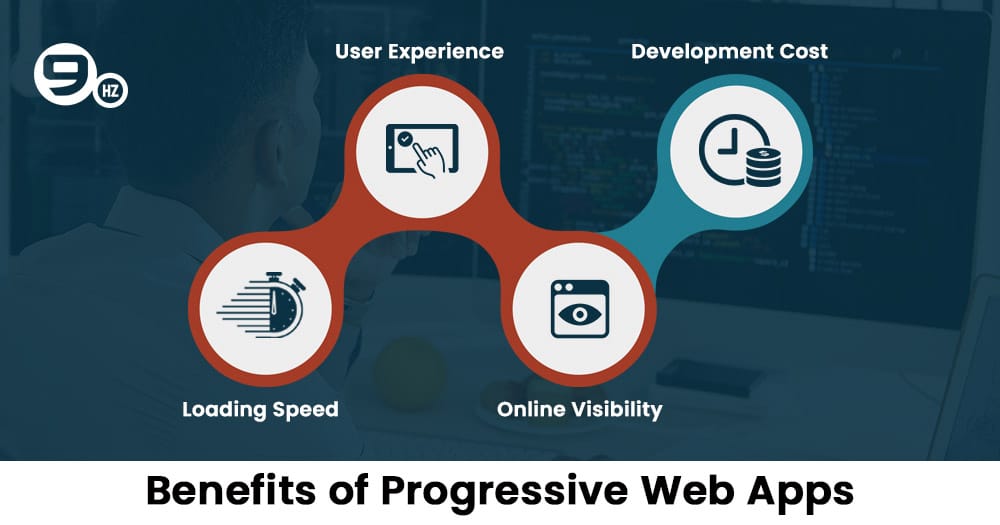
Although you just read why native apps make for a sound-cool option for app developers, there are a number of ways in which they lose the game to PWAs. Wondering what they may be? Here are the prominent reasons why developers still opt for progressive web app development:
1. Loading Speed of PWA Apps
Progressive web apps take a hand from service workers in order to manage requests along with caching as well as the storage of shell data. As a result of that, the app shell begins to load more steadily as compared to a native app.
Loading speed is faster for the user even at times when they are not in connection with the internet. Note that no new information can be available there until they are reconnected with the internet as loading speeds have a significant impact on both retentions as well as engagement. So this is what makes for one crucial benefit of PWA development.
2. User Experience
Progressive web apps enable you to provide your users the unified experience of keeping up with the same app installed on their device and interface in their browser. This eradicates any demand for the user to get familiar with more than one interface and it makes for a user experience that leaves no room for frustration when your users are on their mobile web app.
Native apps also need more storage space on your users’ devices. This counts as a factor that is preferred by users who have limited storage space. In the case of PWAs, users have an easy way into your app’s fullest operations without needing to think about storage or a heavy download period.
3. Development Cost of Progressive Web Apps
To construct a progressive web app that can function across multiple platforms as well as operating systems is not only cost-effective but it also drastically cuts down the workload, resulting in ultimate efficiency. Furthermore, creating a separate native app for an Android platform and the iOS platform is only going to ask you to splurge more time on bringing in new features and timely updates that have relevance to that specific operating system.
4. Online Visibility
There is no second thought to the fact that native apps are far more seamless when it comes to placing them in app stores, but progressive web apps still have better visibility, thanks to the behavior of PWA development. Since PWAs are developed using app-imitating web pages, it becomes easy for users to find your business app online apart from the app store.
This opens the door for you to leverage and utilize SEO to reach out to your valuable users in a remarkably cost-effective fashion. Besides that, it also lets users share the URL of an app page effortlessly, amping up the scope of organic growth and user engagement.
Also Read: Web Development Frameworks 2024
Benefits of Native Apps
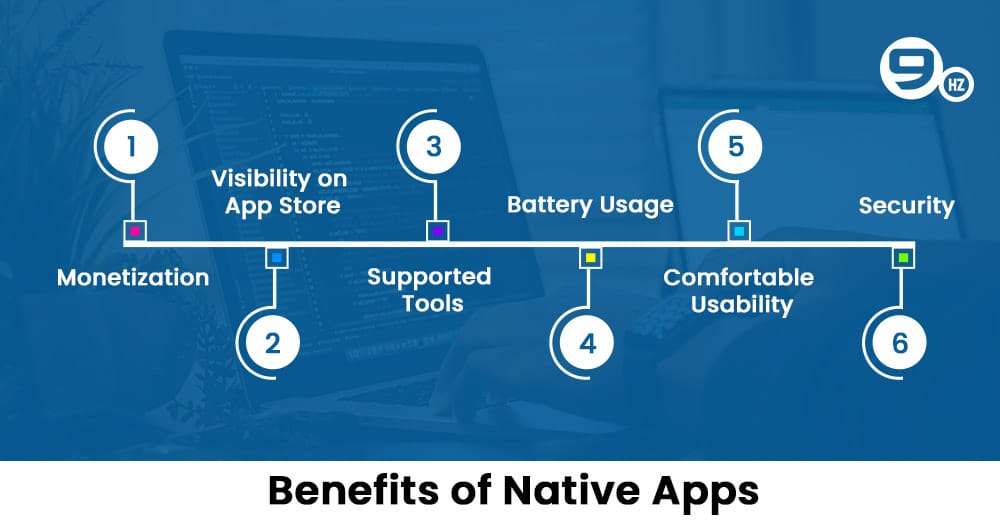
1. Supported Tools
During the native app development, you will take a hand from a range of developer-supported tools in co-occurrence with the relevant OS. Now if you look at the comparison, a PWA does not feature such options to ease development and streamline the whole process as they are not built for a single platform.
2. Monetization of Native Apps
A native app is capable of integrating payment processing with the app store of the user which makes it seamless for users to initiate purchases as well as subscriptions. If you wish to monetize a progressive web app, you will need to integrate your own system of payment.
3. Visibility on App Store
Yes, one of the interesting benefits of native apps is this. While both a native app, as well as a PWA, can be launched on the App Store, this entire process behaves to be more complex for a progressive web app. In the case of a PWA, you will be required to write a native wrapper that is used to record the native iOS capabilities of your app. You also need to come up with genuine proof that you are a legal and registered business.
You can direct your time towards utilizing your resources on Apple Search Ads (ASA) and App Store Optimization (ASO) instead, thanks to faster access to app stores. Both ASO and ASA are cost-effective ways to acquire the attention of high-value users, encouraging them to install your app.
4. Comfortable Usability with Fellow Native Apps
One of the noteworthy benefits of creating a native app for the iOS and Android platforms is that this type of app interacts well with other native apps. For instance, when you would like your app to enable users to easily connect with Facebook.
5. Security in Native Apps
Another incredible benefit of native app development is security. It becomes super easier to exercise robust security functionality with native apps. One of such feature is two-factor authentication as the app gets access to required device information. On the other hand, progressive web apps require their own security certification. In the case of native apps, TLS certificates can easily be embedded to make sure that optimum security standards are being met.
6. Battery Usage
Progressive web apps are not as cool in terms of battery consumption because these apps are not written in the native language of a hardware. While this may encourage some users to minimize their interaction with a PWA, this problem can be avoided simply by inviting in the idea to build a native app.
PWA Vs Native App: Which One Should You Choose?
Both Progressive web app VS native apps come with their own definitions of strengths and downsides. While you are on the tangent of choosing one between them, you must make a note of the parameters to which each option excels, and also, how they do justice to your goal and vision of your business app.
Here’s what we have to offer as a piece of advice.
You should consider opting for a Progressive Web App in case-
- You have started with a business recently and would like to bring a plain app to the table for your user initially. PWA does not demand a download process and allows you to communicate with the user using push notifications.
- You have a strict budget and time constraints. PWA consumes notably less time as well as money and effort in order to develop and publish.
- You want to level up brand awareness along with SEO. PWA resembles a website and it is capable of interacting with a wide-scope of audience.
You should consider opting for a Native App in case-
You would like to create credibility for the brand. Publishing apps on the app store amplifies reliability and it is to know that a native app features more security.
Conclusion
Getting into mobile app development decision-making can be a perplexing task and for the sake of your dream startup or business, it is not something that should be rushed. You must take your moment enough to weigh all the pros and cons of all the options before you head to start to build a PWA or a native app.
If your target users are of a data-conscious mindset and they focus on something that saves their time, then it is good for you to go with a progressive web app because it demands no downloads. In case, the operations and functionality of your business is more on the complex side and you want it to be available on the app store for brand reliability then you can go on and rock the native app option.
We hope this section has unfurled all the answers you have been spending your time looking for. The varying opinions on the PWA vs Native app comparison.
FAQs On Native App Vs PWA
Q1. What is the Difference Between a PWA and a Native App?
A1. A PWA (Progressive Web App) is a web application that is designed to provide an app-like experience to users. On the other hand, a native app is developed for a specific platform like iOS or Android and needs to be downloaded and installed on the user’s device.
Q2. Which one is Faster, PWA or Native App?
A2. Both PWA and native apps can be fast, but native apps generally have an edge over PWAs in terms of performance. Native apps are developed specifically for a platform, whereas PWAs run on web browsers and may not have access to certain hardware and software features.
Q3. Are PWAs More Affordable to Develop than Native Apps?
A3. Yes, PWAs are typically more affordable to develop than native apps because they use web technologies like HTML, CSS, and JavaScript, which are widely known and accessible. In contrast, native app development requires platform-specific knowledge and may require hiring specialized developers.
Q4. Can PWAs be Downloaded from an App Store?
A4. No, PWAs do not need to be downloaded from an app store. They can be accessed directly from a web browser using a URL or added to a user’s home screen as an app shortcut. However, some app stores allow PWAs to be listed alongside native apps.
Q5. Which one Should I Choose for My Business, PWA, or Native App?
A5. The decision between PWA and a native app depends on several factors, including the complexity of your app, target audience, budget, and business goals. If you have a limited budget and want to reach a wider audience, a PWA may be a better choice. However, if you need advanced functionality or want to offer the best user experience, a native app may be more suitable.
Great Together!
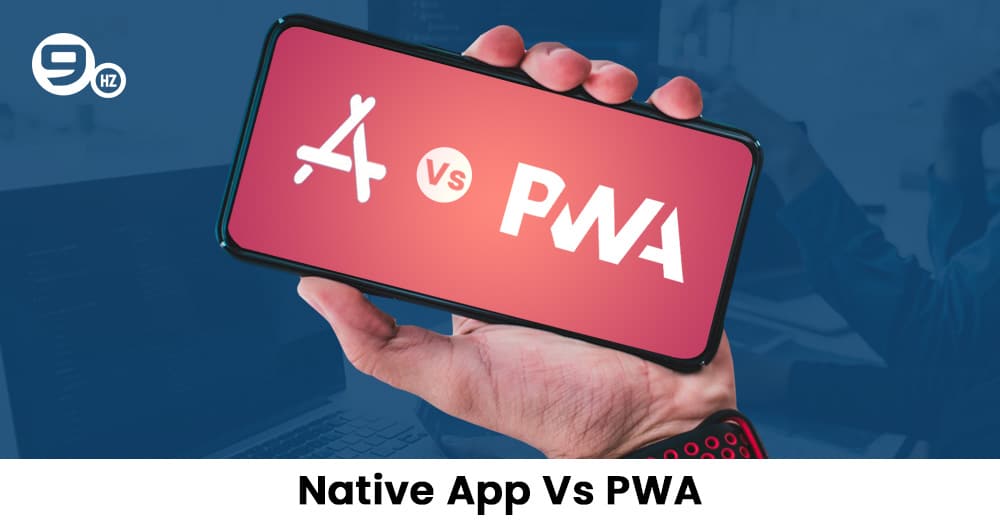
![How to Create an App like Careem? [Cost in 2026]](https://theninehertz.com/wp-content/uploads/2024/09/how-to-create-an-app-like-careem.webp)







